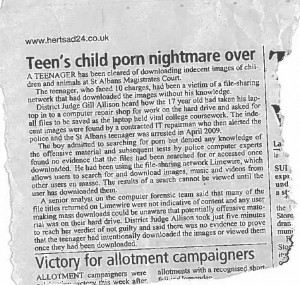With all the current debate going on regarding cost sharing and the Digital Economy Act it is interesting to look into the future to try and see the mess there is going to be when people start getting warning notices and then wanting to appeal against them.
Ths clip below is from The Herts Advertiser24 a local paper in St Albans. It concerns a teenager taken to court for downloading indecent images of children and animals. The teenager had been using Limewire to download porn but had not realised that his PC was being seeded with other images and did not in fact know they were there.
The judge took five minutes to dismiss the case based on insufficient evidence. What is going to happen when a teenager’s parents, the bill payers for the broadband connection, are accused of Copyright Infringement under the DEAct. Not only are they not the ones infringing copyright but the person doing the infringing (ie the teenager) may not have know that he was sharing a specific file. I’m not a judge but I forsee some short court cases with lengthy appeals.

3 replies on “Digital Economy Act – problems lie ahead #DEAct”
That’s one reason why I think that, since we can’t stop this, Ofcom should at least set the warning threshold higher than is currently proposed. It would be all too easy to catch “false positives” from P2P data, such as the example above, yet a better reflection could be achieved by raising the sample size so that only frequent CIR / “suspected” offences are identified before the first letter being sent. The question is, how high?
the ambulance chasers are rubbing their hands with glee. they are the only ones going to profit from this stupid act…
This looks like a nice example of real life web use and points nicely to an important wider argument. We often read about the act described as driven by concerns for keeping the law and preventing the loss of income to creative industries. However it is increasingly described as something that will be expensive to enforce and costly to the public purse, at a time where cost cutting is imminent in public spending.
If we now add that the technical and judicial complexities of enforcing the DE Act are now likely to be much more expensive and way more impractical.. as in the above case we have a strong arguement for being sensible about copyrights and rights to copy.